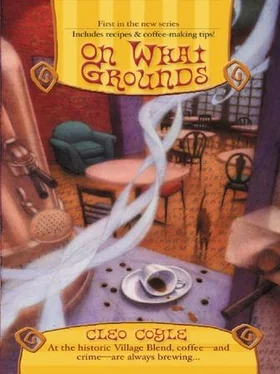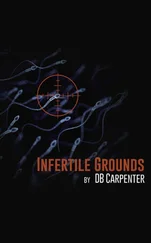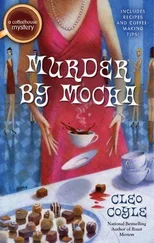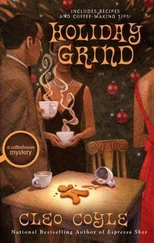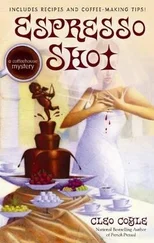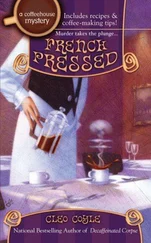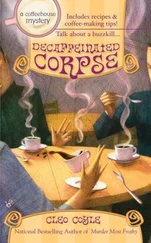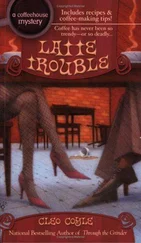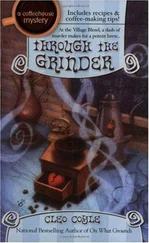While I prepared the items for the cheesecake topping, Matt went to work behind me, bumping and elbowing me the entire time. God, he was annoying in the kitchen!
First he set a pot of water on the stove and lit the fire under it. A moment later I heard the crinkle of shopping bags as he dumped his plunder onto the counter.
“They had Maytag Blue Cheese—for once,” Matt said as he tossed a blue-marbled brick of soft cheese into the refrigerator.
I arched my eyebrow. “ ‘Essentials,’ you said. Frightfully expensive blue cheese is an essential ?”
“It is—in my house,” he said.
Just let it go, I chanted to myself. Don’t take the bait. Just let it go.
“And here,” he added. “Look at this!”
Matt proudly displayed a slab of bacon the size of Rhode Island.
“So you’ve brought home the bacon at last,” I blurted. Whoops.
“Very funny.”
Matt loaded the crisp green leaves of Romaine lettuce into the vegetable bin, and plastic containers of grated cheese onto the refrigerator shelf next to a pint of heavy cream.
“So,” he said, “speaking of, uh, ‘bringing home the bacon’—is that why you came back here from New Jersey to manage the Blend? Are you having money problems?”
“No.” I bristled. “I was doing just fine, thank you very much.”
“So what’s the reason then? Why did you come back?”
Matt leaned a hand on the counter. With his rolled-up shirtsleeves, his muscular forearm caught my eye. Tanned by the Peruvian sun and slightly dusted with fine black hair, it reminded me of the first time we’d met on a brilliant June day along the Mediterranean.
I was a college student at the time, spending the summer with my great-uncle’s family while studying Italian art history. He was backpacking across France and Italy, heading for Greece. I’d thought he was a Michaelangelo statue come to life. Stop it, Clare. I warned myself. Stop it.
His dark brown eyes locked onto my green ones—he was waiting for an answer.
“I, uh…I guess I wanted a change,” I told him, attempting to change something else in that moment—my focus. I forced my eyes to shift away from his forearm and over to a two-pound bag of Carbone’s homemade fettuccini. “The suburbs were nice enough, don’t get me wrong. I mean, New Jersey has its charms—”
Matt snorted.
“It does. And it’s a good place to raise a child. I was happy there, at least in the beginning. But now that Joy’s gone away to school—never to live with Mom again—I thought I should try making a change, take Madame up on her offer to start again.”
“That’s it?”
“What do you mean, ‘That’s it’? Gail Sheehy created an entirely revised version of her book Passages based on that premise alone.”
Matt stared blankly.
“You know,” I said, “ New Passages ?”
Matt continued to stare blankly.
“Longer life spans,” I explained. “Second Adulthoods that begin after children leave the nest? You’ve never heard of this?”
Matt shook his head.
“Well, you’re older now, too,” I reminded him. His eyebrow rose, as if to say duh. “What I mean is: Haven’t you thought about the changes that come with reaching middle age?”
Matt dismissively waved his hand. “I never think about that stuff.”
Of course you don’t, I thought, because you’re another type that Sheehy writes about—the man who wakes up one morning on the Dark Side of Forty and realizes his bright future full of possibilities has dimmed and narrowed. That he’s too old to be a young…Well, a young anything.
Matt would never admit it, but I was pretty sure his sprint to Parasol Insurance earlier today was evidence he was reaching that Dark Side of Forty stage. The old Matt never thought ahead, never took responsibility, and never, ever took cash out of his own pocket to help clean up a mess.
The old Matt would have taken the first plane out of town—waved aloha to me and Madame and let us pull out the buckets and mops while he made a deal at a luau for five hundred bags of Kona.
Sure, I could chalk up the change to Madame’s ownership deal. Even experiments in public housing (according to one of my customers who worked for the City of New York) have suggested that if you give people a way to own a thing, they suddenly find the time, energy, and money to invest in protecting and improving it.
And yet…that ownership theory didn’t really hold water when it came to Matt. For one thing, I was sure Matt had already assumed he’d inherit the Blend anyway—yet his actions had always been aloof where the Blend’s business was concerned. All he ever seemed to care about was the freedom to come and go as he pleased.
And—in terms of ownership theories—what about me? I found myself thinking. When I was his exclusively, he took me for granted. Just like the Blend.
Whether it was the new part-ownership status or the Dark Side of Forty change-in-perspective thing, I didn’t know. All I knew was that Matteo Allegro was showing positive signs of change.
Change is (usually) good. And ten years ago, I would have rejoiced at it. But I couldn’t rejoice now. Now our child was grown—and I wanted my freedom. After all the years of pining away for the man, I had finally reached an emotional point in my life where I wanted to be free of Matteo Allegro and all of his heartbreaking patterns.
Madame wouldn’t understand or accept my decision, but that was just too bad. Even with her cancer scare, I’d find a way to gently tell her. A tricky scheme (even one as well meaning as Madame’s) wasn’t going to erase years of pain, frustration, and resentment. Not for me anyway.
“Heads up,” Matt said, tossing me a bundle of fresh garlic. I caught it.
“It goes in the hanging basket behind you,” he said with a wink.
God, this was infuriating. My ex-husband knew my kitchen better than I did—and wasn’t shy about making sure I knew it. Well, I reminded myself, he had lived here as a boy with his mother before Pierre had moved them up to Fifth Avenue. Resentment rose in me anyway. I checked my watch. For Joy’s sake, I reminded myself yet again, I wasn’t going to start any battles with her father. Not before dinner anyway.
“So what’s on the menu?” I said, changing the subject to one that was nice, safe, and neutral: Food.
“I’m going with the fettuccini carbonara,” he said. “It’s rich—especially when I make it with fettuccini instead of thin spaghetti—but Joy always loved it when I cooked it for her. And it’s probably the only dish I can still cook better than my soon-to-be-chef daughter. She’s probably a real pro now that she’s been formally trained.”
“Matt, she just started culinary school. She’s years from graduation,” I said. “In fact, she confessed to me that she’s having a little trouble in one class. Apparently a hollandaise broke and the guest instructor humiliated her in front of the rest of the class.”
“Maybe she needs a few pointers from her dad.”
“You think you could help her?” I asked hopefully.
“Sure. And this should cheer her up, too.” Matt reached into his pocket and withdrew a small, square box. “Check this out,” he said.
I opened the box.
“I picked it up in Mexico,” said Matt.
I looked down and almost winced. Not again.
When Joy was nine, Matt brought a bracelet back from one of his endless trips and gave it to her. The bracelet was lovely, its delicate links made of pure, fourteen-karat rose gold. Since then, Matteo had presented her with various charms, distinctive little items he found over the years in foreign lands on his never-ending quests for the richest coffees, the bluest waves, the tallest mountains—and (I’m sure) other sorts of stimulation as well (cocaine and women).
Читать дальше
